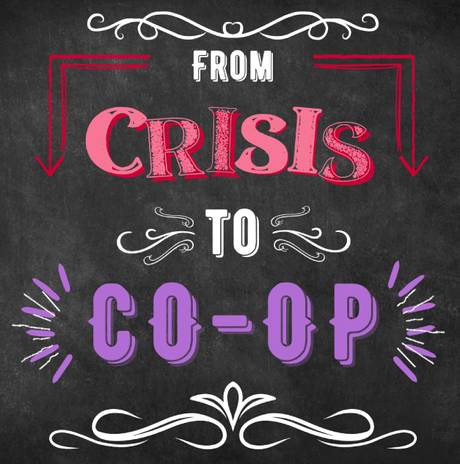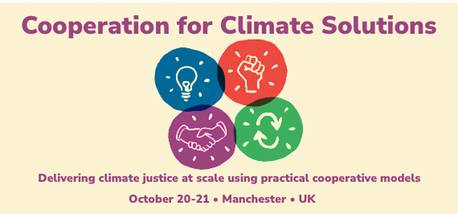Co-operative Assistance Network Limited
News
For more information about any of the news items below, or for any general enquiry, please contact Austen Cordasco, Internet Marketing Team Leader, at This email address is being protected from spambots. You need JavaScript enabled to view it. or 07795 430599.
Read our newsletters here.
Report from Future Co-operatives
Grass roots organisations will be more resilient, and the co-operative movement now better understands their needs

Future Co-operatives is an annual conference organised by Co-operative Futures. This year it took place in Oxford in February and CAN’s National Marketing Team Leader Austen Cordasco attended. This is his report.
It was excellent to meet up with colleagues from around the country after two or three years: friendships were reaffirmed and new contacts made. The conference was fully attended, everyone is an activist and there was a wealth of wisdom and experience present.
Conference opened with a film about a variety of community projects around the UK that were set up by local groups to support people through lockdown and restrictions imposed as a result of the pandemic, but which have continued to operate due to the cost of living crisis. They address issues of food purchase and distribution, housing, digital exclusion, energy and heat supply, transport and so on. Some are faith-based, some also campaign, some struggle with premises more than others etc. No two are the same but each is a grass roots, self-organising group that formed without little or no support from institutions or the co-operative movement.
UN General Assembly adopts the first resolution on the social and solidarity economy

The United Nations has adopted the first Resolution on promoting the social and solidarity economy for sustainable development during the General Assembly held today 18th April 2023.
As an observer of the UN Task Force on the Social and Solidarity Economy (UNTFSSE), the International Cooperative Alliance (ICA) has been part of the discussion over the last few years, and welcomes this important step in mainstreaming and enhancing the international dimension and profile of the SSE.
The resolution includes a definition of the SSE as “enterprises, organisations and other entities engaged in economic, social and environmental activities which serve the collective and/or general interest, based on the principles of voluntary cooperation and mutual aid, democratic and/or participatory governance, autonomy and independence and the primacy of people and social purpose over capital in the distribution and use of surpluses and/or profits”. Recognising cooperatives as part of the SSE (together with associations, mutual societies, foundations, social enterprises, self-help groups and “other entities operating in accordance with the values and principles of the social and solidarity economy”), the resolution will coexist with existing UN resolutions on cooperatives in social development, adopted since the 1950s.
Help to avoid heartache – and save money!
As and When contracts help organisations budget and create their upgrade path

A positive sign recently has been an increase in enterprises seeking CAN support on getting employment practices up to scratch.
We still help out with ‘after the problem’ disputes, negotiating settlements and even industrial tribunal representation. However, it’s good to see an increased proportion of our work is helping enterprises ensure that they have a good structure to their contracts of employment and/or contracts with sub-contractors, policies, procedures, management and support practices.
 HR Consultancy Team Leader This email address is being protected from spambots. You need JavaScript enabled to view it., pictured, said: “As more and more see the value of chipping away at getting things up-to-date, legally compliant and fit-for-purpose for both employer and worker, then more are taking advantage of their As and When contract with CAN.
HR Consultancy Team Leader This email address is being protected from spambots. You need JavaScript enabled to view it., pictured, said: “As more and more see the value of chipping away at getting things up-to-date, legally compliant and fit-for-purpose for both employer and worker, then more are taking advantage of their As and When contract with CAN.
“This helps organisations budget an affordable amount to get their current situation benchmarked and set out on an upgrade path based on recommended priorities. Its so good to see such a positive trend developing.
“Over time it will save a lot of heartache and a lot of money.”
Find out more about purchasing from CAN, and our As and When contracts
Taking heart from the lessons of history
CAN holds pricing for this financial year

CAN charges will not rise for 2023-4 whatever happens to wage or price inflation.
CAN increased its charges last year after holding them unchanged for the previous six years. Despite this increase being largely wiped out within months by cost and wage inflation the directors have decided that there will be no further increase in charges for the next financial year.
 Marketing Team Leader This email address is being protected from spambots. You need JavaScript enabled to view it., pictured, said: “When everybody is hurting we feel we have to take our share of the pain.
Marketing Team Leader This email address is being protected from spambots. You need JavaScript enabled to view it., pictured, said: “When everybody is hurting we feel we have to take our share of the pain.
“We take heart from the lessons of history. When the pressure is on, co-operatives and social enterprises always prove to be the more resilient forms of enterprise. We may not own much right now but we surely own the future.”
For details on CAN prices and terms of trade, please click here.
There’s more information about our products and services here. To make an enquiry please click here.
Community shares used to match Community Ownership Fund awards

Following a pattern established during the first round, about 30% of Community Ownership Fund Round 2 awards announced at the end of last year were societies using community shares in their financial models, and also as their match funding.
The Community Ownership Fund is providing £150 million over four years to support UK community groups take ownership of assets and amenities at risk of being lost. Voluntary and community groups can bid for match funding to acquire important assets and run them for the benefit of the local community.
At least nine of the 31 grants – totalling £2,407,615 – awarded in Round 2 used community shares for their match funding.
Two Bristol groups, both supported by CAN to develop and launch their community share offers, applied in Round 2.
How to create better outcomes by improving stakeholder awareness
Deeper insights into and a shared understanding of stakeholders and their needs will result in better planning, more appropriate governance, systemic improvements, greater efficiency, an increased chance of survival and better outcomes.

An organisation will struggle or fail if it doesn’t operate in the interests of its key stakeholder group, balance the interests of all its stakeholder groups and involve stakeholder groups in governance appropriately. Therefore it’s crucial for an organisation to know and understand its stakeholder groups and their needs.
It is tempting to assume that an intuitive understanding of stakeholder groups will suffice – and indeed that may have got you this far – but deeper insights and a shared understanding that lead to improved stakeholder engagement will result in better planning, more appropriate governance, systemic improvements, greater efficiency, an increased chance of survival and better outcomes.
Carrying out an analysis of stakeholders may have some surprising results and may change perspectives. In any case, times change and it is important to keep up with stakeholders’ changing needs.
A stakeholder analysis report can provide evidence to funders and supporters and is a crucial component of any corporate feasibility study. It is necessary for social enterprises and community businesses in particular to have a detailed understanding of, and rich relationships with, their stakeholders.
CAN welcomes news of funding to empower social tenants
CAN welcomes news of a £500,000 government grant to housing support organisations for training social housing tenants, enabling them to engage more effectively with their landlords and gain a stronger voice.
The training will be provided by the Confederation of Co-operative Housing (CCH) and Public Participation, Consultation and Research (PPCR), to help residents living in England gain a “higher quality of service” from their landlords where needed.
CAN worker reaccredited as Community Led Homes Adviser

We’re pleased to report that CAN’s housing co-ops lead worker Hilary Sudbury has been reaccredited as a Community Led Homes Adviser.
Community-led housing is a growing movement whereby people take action to manage and/or build affordable homes.
CAN delivers training, consultancy and support for those wanting to take control of their housing through housing co-operatives. If you would like to make an enquiry, please contact Hilary, our Housing Co-ops lead worker: This email address is being protected from spambots. You need JavaScript enabled to view it..
A CAN worker’s report on Co-operative Ways Forward 2022: Co-operating for Climate Solutions

By John Merritt
The Ways Forward 2022 conference in October set out to explore the key role of co-operation in community-led responses to the climate crisis, “that not only enable us to take action to cut our emissions, but also build the new organisations and businesses that we need for a regenerative future, and do it in a just and fair way”. CAN’s John Merritt went along, and penned this report.
Bristol and London events will discuss new federation of worker-led co-ops

Centrespace Gallery, BristoI. Image: Google
Workers.coop, a “self-organising collective with big plans”, is running events in Bristol and London as part of a series that aims to “raise awareness, get feedback and start organising” in its mission to build a new national federation of worker-led co-ops.
Workers.coop aims to develop industry networks, provide advice in an agile way and make worker co-op options available to new sectors and young workers in particular, with an orientation to the social justice movement. You are invited to get involved at this crucial start-up stage.
Subscription-based services

An increasing number of our clients are signing up for our subscription service because they find it offers convenience, flexibility and control without imposing any obligation to purchase and there are no additional fees. It works like this:
After an initial, free consultation, we set up an As And When Contract (AAWC) with the purchaser, using one of a number of templates that we have developed and refined over many years. This enables them to draw down services from us as and when required.
To place an order, we negotiate terms and use a Confirmation Of Instruction (COI) form to agree them. We then deliver the services, which may be consultancy, training or business services, and we invoice against the work done. As per our Terms of Trade, we do not charge for administration, research, travel downtime or expenses, unless agreed in advance due to nature or location of the work.
If more time or another service is required another COI is raised and agreed. In this way a client may be receiving, for example, payroll services for a year, a couple of days of HR support and a business strategy workshop.
It is the convenience of being to place an order quickly and with minimal fuss when an AAWC is already in place that our clients like so much.
If you would like to take advantage of our subscription service or would like to make an enquiry, please contact our Society Secretary, Brian Titley: This email address is being protected from spambots. You need JavaScript enabled to view it..
